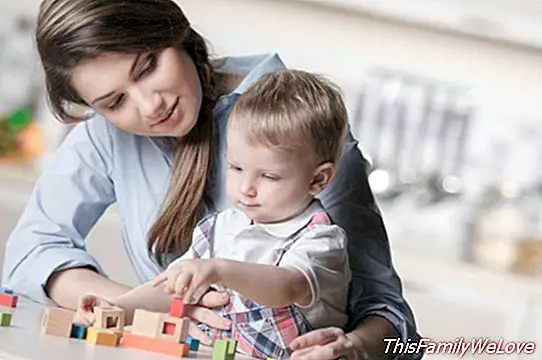Games and toys, do we know how to play with our children?

Playing with children between three and six years old is a challenge that many adults do not know how to face. They are no longer the babies that any carantoña made happy, nor kids who yearn to enter our adult world. Do we know how to play with our children?
How to introduce us to their world of play and fantasy, where an overwhelming logic prevails, but radically different from ours? How to believe that we are the big bad wolf or Little Red Riding Hood's grandmother? The answer is as simple as this: going back to being children.
Only if we do an effort of abstraction, and we put ourselves in the place of our son we can understand that this imaginary world, so surprising and creative, is the most real for the child ... and that we are also called to enter it.
Equality in the game: put yourself at its height
The best way to enjoy our children playing, really get up to it and enter into their fantasy world, is letting us take their stories, interpreting the roles they ask us and, above all, forgetting our rigid role as adults and controlling and demanding parents.
In daily life the relationship between father and son is one of demand and fulfillment, but In the game, we are all the same. Must be more relaxed and relaxed, letting them enjoy those occasions in which, through the game, take advantage of changing roles and be they who have the baton and mark the rules.
They love to get older and do what in real life they are not allowed, simply because of the condition of being children. Hence, his favorite game is the "symbolic game", kitchens, moms and dads, teacher-students ...
Play with your child to meet him
The JThis is a great tool to get to know the children and educate them. Through the game, we can observe them and see how they react and act before each of the characters they try to represent. They love being dad, mom, their teacher ... That is, their models and reference figures. If we see how they behave we can know how we behave. They are excellent imitators and, therefore, the game is a wonderful mirror in which we can see ourselves reflected.
It can also serve us to know how are your social relationships, what role do they occupy in the peer group: possible leaders or not, integrated into the group, withdrawn, go unnoticed ... The game will also allow us to know more about the role of the rest of their friends and their different personalities. We will not only know your group, but also the importance that this or its members have for our child.
The game can take us to school and the classroom, learn more about the teacher, classroom routines, classmates, activities and favorite subjects ... We can discover their interests, tastes and preferences. As well as their fears and concerns.
Play to educate
At the same time we know them while we play with them, also, we can take advantage to mark certain standards, that is, to educate them. It is a very interesting tool, since they do not feel required or controlled, as can happen in everyday situations. They are in a fun environment in which, in addition, in most cases, they are adults, so they are the ones who set the guidelines and standards, which can be recommended by us.
But not only does the game serve us to know and educate them. They also take a very important part of this precious moment shared with us. The first and most important thing they get is to enjoy time with us. Nowadays it is a luxury for them to be able to count on their parents for a while, since time is what is constantly missing.
Plus, it's a quality time because we are with them only and exclusively without distractions. They count on us in a fun and relaxed way and they know a part of us closer.
Daily routines often prevent us from showing ourselves as we are since we have to fulfill the role of father or mother. They can also know what we like, what is given to us better or what our limitations or weaknesses are.
Conchita Requero
Advice: María Campo Martínez. Director of Nursery Schools N-Clic Kimba




